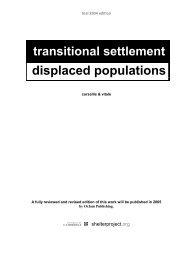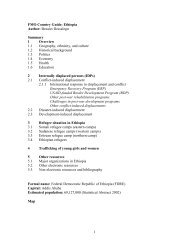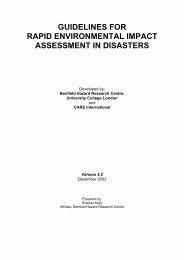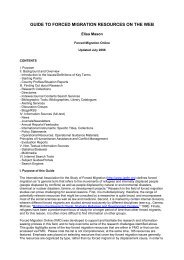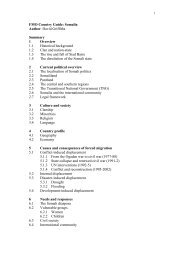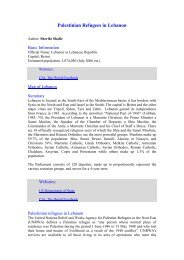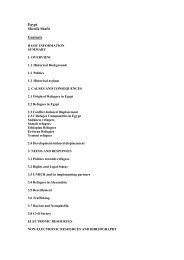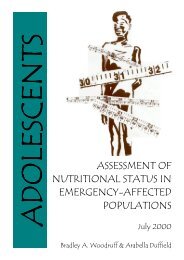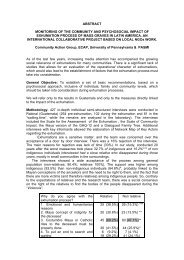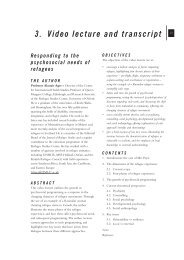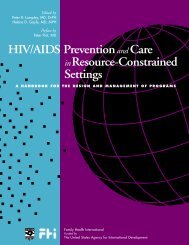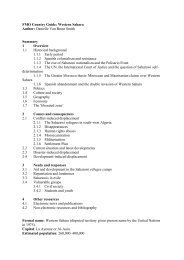Afghanistan. - Forced Migration Online
Afghanistan. - Forced Migration Online
Afghanistan. - Forced Migration Online
You also want an ePaper? Increase the reach of your titles
YUMPU automatically turns print PDFs into web optimized ePapers that Google loves.
control of Kabul. (See Conflict-induced displacement) .<br />
Websites:<br />
U.S. Department of State<br />
NATO<br />
2.2 Current Political Overview<br />
2.2.1 The Bonn Agreement (2001-2005)<br />
In December 2001, an interim administration was established under the UN-brokered Bonn<br />
Agreement. The agreement encompassed an interim power sharing arrangement, the creation<br />
of a new constitution, and elections in 2004. The agreement aimed to form a multi-ethnic<br />
broad-based government with the establishment of a thirty-member executive council, led by<br />
the Pashtun leader Hamid Karzai. The agreement acknowledges ‘the right of the people of<br />
<strong>Afghanistan</strong> to freely determine their own political future, in accordance with the principles<br />
of Islam, democracy, pluralism, and social justice.’ The transitional government was given a<br />
mandate of six months.<br />
Key ministerial positions were filled by members of the United Front (UF) who were active<br />
during the mujahudeen era – some of which were responsible for countless human rights<br />
violations. Following the agreement, some commanders, such as Uzbek warlord Abdul<br />
Rashid Dostum, threatened to boycott the interim government. The exiled king Zahir Shah<br />
returned to <strong>Afghanistan</strong> as a figure head and a unifying force in the country. Despite the<br />
appointment of Karzai as the head of the interim government, many Pashtuns felt<br />
marginalized by the process, and remain unsatisfied with the high representation of UF<br />
commanders in the administration. The ‘Interim Authority’ was given a seat at the UN. The<br />
Bonn Agreement also established the mandate for a UN international peace-keeping force –<br />
the International Security Force for <strong>Afghanistan</strong> (ISAF).<br />
A critical component of the Bonn Accord, was the emergency loya jirga which was convened<br />
in June 2002, with a participation of up to 1,500 Afghans from all over the country. The aim<br />
of the jirga was to give political legitimacy to the peace process and approve the broad-based<br />
Afghan Transitional Authority (ATA), which would run the country through to 2004. This<br />
was followed by a ‘Constitutional loya jirga’ which was convened in December 2003 and<br />
finalised in January 2004. Upon transfer of power, all mujahedeen and Afghan armed forces<br />
and groups were meant to come under the control of the ATA. Democratic elections for the<br />
Presidency were to be held in mid-2004 and in September/October 2005, parliamentary<br />
elections and provincial elections were held. This marked the end of the Bonn process which<br />
was formalised at the London Conference in 2006 with the signing of the <strong>Afghanistan</strong><br />
Compact.<br />
Websites:<br />
Human Rights Watch<br />
Q & A on <strong>Afghanistan</strong>’s Loya Jirga Process<br />
<strong>Afghanistan</strong>’s Bonn Agreement One Year Later<br />
Afghan Government<br />
International Crisis Group<br />
George Washington University<br />
International Constitutional Law<br />
7



